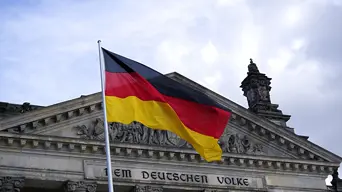Germany's Scholz under pressure to call early vote after coalition collapses
Germany's conservative opposition heaped pressure on Chancellor Olaf Scholz's crisis-hit government Thursday to allow for speedy elections by calling a confidence vote next week rather than next year.

Picture: Pexels from Pixabay
BERLIN - Germany's conservative opposition heaped pressure on Chancellor Olaf Scholz's crisis-hit government Thursday to allow for speedy elections by calling a confidence vote next week rather than next year.
Christian Democrats (CDU) chief Friedrich Merz made the demand after Scholz's three-party coalition imploded on Wednesday, just as the world was digesting news that Donald Trump is headed back to the White House.
Merz - whose centre-right alliance with Bavarian sister party CSU is leading in opinion polls - said Scholz's unhappy alliance with the Greens and the Free Democrats had "failed."
After months of bitter infighting, it finally broke apart on Wednesday night after the chancellor sacked his rebellious finance minister Christian Lindner from the Free Democrats (FDP).
The shock move leaves Scholz's Social Democrats and the Greens ruling in a precarious minority government, where it will have to ask Merz's party to back laws on a case-by-case basis.
Scholz said he would seek a confidence vote by 15 January so lawmakers can decide whether to call early elections by March - more than half a year ahead of a previously scheduled September vote.
Scholz said he would reach out to Merz on Thursday, emphasising in a message on X that "cooperation and compromise have made Germany strong ... I'll continue to work on that."
But the ambitious opposition leader made his own demand -- calling for a confidence vote now to pave the way for elections as early as January.
"The decision taken last night... is the end of the coalition government and thus the end of this legislative period," Merz told party colleagues.
"There is absolutely no reason to ask the vote of confidence until January," he added ahead of expected talks with both Scholz and German President Frank-Walter Steinmeier, who urged "reason and responsibility" from all sides.
'LEFT RUDDERLESS'
On Wednesday night, CSU leader Markus Soeder, had already demanded that "there must be no tactical delays."
Alice Weidel of the far-right Alternative for Germany (AfD) party made the same demand, calling the end of the coalition a long-overdue "liberation for our country."
A new opinion poll gives the CDU/CSU alliance 32 percent support -- one point ahead of the combined total of the SPD with 15 percent, the Greens with 11 percent and the FDP with only five percent.
The AfD scored 18 percent in the Ipsos poll, making it the second strongest party, but so far it is unlikely to enter any government as all other parties have vowed not to cooperate with it.
Germany's political turmoil could not have come at a worse time for Europe's biggest economy, which is set to shrink for a second year in a row amid dire geopolitical challenges.
"The early end of the coalition leaves Germany somewhat rudderless in what could be an exceptionally turbulent time right after Donald Trump won the US election," wrote Berenberg bank analyst Holger Schmieding.
But Schmieding said a snap election and new leadership in early 2025 may ultimately help as "the constant bickering within the now-defunct three-party coalition had turned into a major obstacle to growth."
Scholz was due to head to an European summit in Budapest on Thursday to discuss global crises, including Ukraine's war with Russia and the Middle East conflict, all impacted by the US election outcome.
Leaders are gathering for the talks hosted by Hungarian Prime Minister Viktor Orban, a Trump supporter and one of the EU's main sceptics of support for Kyiv.
NATO chief Mark Rutte on Thursday expressed confidence in Germany remaining a key player on the world stage.
"I'm sure that when it comes to defence, when it comes to foreign policy, that Germany will be able to fulfil its obligations," Rutte said. "I'm not worried about that."
'INCOMPREHENSIBLE EGOISM'
At home, to shore up his depleted cabinet, Scholz has already tapped his party ally and finance expert Joerg Kukies, to be his new finance minister, government sources told AFP.
One of sacked Lindner's party allies, Transport Minister Volker Wissing, meanwhile opted to bolt his party and stay in his ministerial post, explaining that "I want to stay true to myself."
The FDP had long disagreed with the SPD and the Greens, especially on how to carve up a tight budget and jumpstart the troubled German economy.
Scholz on Wednesday bitterly attacked the ousted finance minister for his "petty political tactics" and accused him of a level of egoism that is "completely incomprehensible."
Scholz declared that "we now need clarity on how we can soundly finance our security and defence in the coming years without jeopardising the cohesion of the country."
"With a view to the election in America, this is perhaps more urgent than ever."